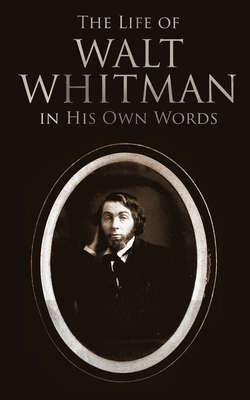Читать книгу The Life of Walt Whitman in His Own Words - Walt Whitman - Страница 140
На сайте Литреса книга снята с продажи.
THREE YOUNG MEN'S DEATHS
ОглавлениеTable of Contents
December 20.—Somehow I got thinking to-day of young men's deaths—not at all sadly or sentimentally, but gravely, realistically, perhaps a little artistically. Let me give the following three cases from budgets of personal memoranda, which I have been turning over, alone in my room, and resuming and dwelling on, this rainy afternoon. Who is there to whom the theme does not come home? Then I don't know how it may be to others, but to me not only is there nothing gloomy or depressing in such cases—on the contrary, as reminiscences, I find them soothing, bracing, tonic.
ERASTUS HASKELL.—(I just transcribe verbatim from a letter written by myself in one of the army hospitals, 16 years ago, during the secession war.) Washington, July 28, 1863.—Dear M.,—I am writing this in the hospital, sitting by the side of a soldier, I do not expect to last many hours. His fate has been a hard one—he seems to be only about 19 or 20—Erastus Haskell, company K, 141st N. Y.—has been out about a year, and sick or half-sick more than half that time—has been down on the peninsula—was detail'd to go in the band as fifer-boy. While sick, the surgeon told him to keep up with the rest—(probably work'd and march'd too long.) He is a shy, and seems to me a very sensible boy—has fine manners—never complains—was sick down on the peninsula in an old storehouse—typhoid fever. The first week this July was brought up here—journey very bad, no accommodations, no nourishment, nothing but hard jolting, and exposure enough to make a well man sick; (these fearful journeys do the job for many)—arrived here July 11th—a silent dark-skinn'd Spanish-looking youth, with large very dark blue eyes, peculiar looking. Doctor F. here made light of his sickness—said he would recover soon, etc.; but I thought very different, and told F. so repeatedly; (I came near quarreling with him about it from the first)—but he laugh'd, and would not listen to me. About four days ago, I told Doctor he would in my opinion lose the boy without doubt—but F. again laugh'd at me. The next day he changed his opinion—brought the head surgeon of the post—he said the boy would probably die, but they would make a hard fight for him.
The last two days he has been lying panting for breath—a pitiful sight. I have been with him some every day or night since he arrived. He suffers a great deal with the heat—says little or nothing—is flighty the last three days, at times—knows me always, however—calls me "Walter"—(sometimes calls the name over and over and over again, musingly, abstractedly, to himself.) His father lives at Breesport, Chemung county, N. Y., is a mechanic with large family—is a steady, religious man; his mother too is living. I have written to them, and shall write again to-day—Erastus has not receiv'd a word from home for months.
As I sit here writing to you, M., I wish you could see the whole scene. This young man lies within reach of me, flat on his back, his hands clasp'd across his breast, his thick black hair cut close; he is dozing, breathing hard, every breath a spasm—it looks so cruel. He is a noble youngster,—I consider him past all hope. Often there is no one with him for a long while. I am here as much as possible.
